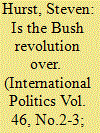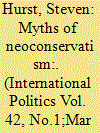| Srl | Item |
| 1 |
ID:
147591


|
|
|
|
|
| Summary/Abstract |
In July 2015, after more than a decade of negotiations, the international community and Iran finally reached agreement over Iran’s nuclear programme. All of the work that produced the Joint Comprehensive Plan of Action [JCPOA] was nearly undone, however, by the United States Congress, which came close to killing the agreement. This episode emphasises the fact that international negotiations are “two-level games” in which policy-makers must take into account not only their own objectives and those of their interlocutors but also the interests of domestic constituencies if they are to secure the “ratification” of an agreement. In many cases, securing the consent of those constituencies is unproblematic, whether because the matter at hand is uncontroversial, domestic interests are disengaged, or policy-makers have sufficient autonomy from them to ignore their objections. In other cases, however, the domestic game can play a huge part in determining the eventual outcome of the negotiating process. As the intensity of the debate within the United States in 2015 and the narrowness of the margin by which the JCPOA survived suggest, the American–Iranian dimension of the nuclear negotiations falls into the latter category.
|
|
|
|
|
|
|
|
|
|
|
|
|
|
|
|
| 2 |
ID:
086399


|
|
|
|
|
| Publication |
2009.
|
| Summary/Abstract |
Several observers have argued that the radical transformation of American foreign policy wrought by George W. Bush is already over. They argue that the 'Bush Revolution' was merely a result of the short-term conjuncture of neoconservative influence and the impact of September 11, 2001, and that this temporary deviation has been ended by the American failure in Iraq. Yet the causes of the Bush Revolution are more fundamental and long-term than this argument implies. It is in the combination of the shift to a militarily unipolar international system and the dominance of the Republican Party by its conservative wing that the real roots of the Bush foreign policy lie, and neither condition is likely to alter in the foreseeable future. Moreover, although the Iraq War has led to some shifts in policy, the Republicans' selection of John McCain as their presidential candidate confirms the continued vitality of the Bush Revolution.
|
|
|
|
|
|
|
|
|
|
|
|
|
|
|
|
| 3 |
ID:
061566


|
|
|
|
|
| Publication |
Mar 2005.
|
| Summary/Abstract |
The objective of this article is to refute the popular and influential view that neoconservatism is the driving force behind US foreign policy under George W. Bush. In fact, neoconservatism ¾ properly understood ¾ has been a marginal influence on a foreign policy, which has been characterized primarily by a different kind of conservative ideology. In order to demonstrate this, the article firstly seeks clearly to define contemporary neoconservatism in the foreign policy context; it then goes on to examine the Bush foreign policy and its key elements. What all this reveals is that US policy has been more driven by nationalist impulses than neoconservative ones. Indeed, those like Stefan Halper and Jonathan Clarke who argue that neoconservatism has been the key component shaping the Bush outlook, not only exaggerate the influence of one particular ideology but underestimate the importance of other key factors determining American policy since 2001.
|
|
|
|
|
|
|
|
|
|
|
|
|
|
|
|
| 4 |
ID:
117023


|
|
|
|
|
| Publication |
2012.
|
| Summary/Abstract |
President Barack Obama's choice of toughened sanctions as the means to prevent Iran achieving nuclear weapons status is discussed. It is argued that that choice is explained less by any belief in their likely effectiveness than by the unattractive and risky nature of the alternatives. The use of force would not eliminate Iran's nuclear programme and risks pitching the region into even deeper turmoil; the 'Grand Bargain' with Iran advocated by others would alienate allies and domestic interests and undermine the administration's wider objectives in the Middle East. The attraction of sanctions, in contrast, is that though unlikely to work they pose little threat to US interests while allowing the Obama administration to stave off demands to adopt high risk alternatives and creating a breathing space for the administration to consider the future evolution of its Iran policy.
|
|
|
|
|
|
|
|
|
|
|
|
|
|
|
|